
Hi everyone! Jim here with a really special treat for you today. I'm interviewing our friend Joe Prostko, who we've known for a good year or so through the Pittsburgh raw food meetup group. You may remember Joe from our cacao pod video a while back.
 We just had a big raw food potluck costume party here, and Joe showed up as an Oompa-Loompa. At first, I admittedly did not get the deeper part of this joke. I simply thought it was a novel costume because it was a character from the Willie Wonka book / movie. Later, however, it really sunk in, as I decided to flip through the Willie Wonka book to read up on Oompa-Loompas. Here's a quote from Willie Wonka author Roald Dahl:
We just had a big raw food potluck costume party here, and Joe showed up as an Oompa-Loompa. At first, I admittedly did not get the deeper part of this joke. I simply thought it was a novel costume because it was a character from the Willie Wonka book / movie. Later, however, it really sunk in, as I decided to flip through the Willie Wonka book to read up on Oompa-Loompas. Here's a quote from Willie Wonka author Roald Dahl:
Read more: Meet Joe Prostko, Who Has Eaten Almost 50 Pounds of Raw Cacao in the Last Year!
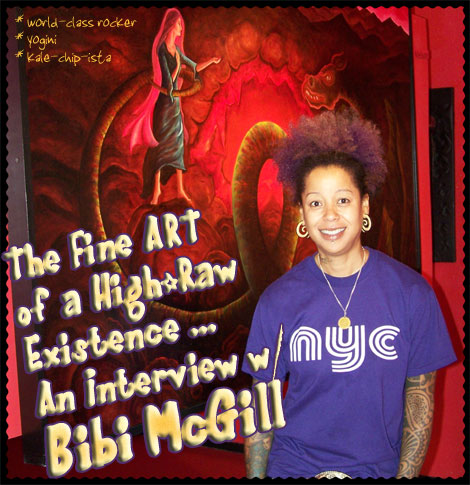
Hi there, Pure Jeevan family! ?Jim here... A few weeks ago, I'd been reading about Bibi McGill, the guitarist and musical director for Beyonce. It was a fascinating piece (linked to below, actually) and, to my complete surprise at the time, touched on her fairly serious interest in raw foods -- and, wouldn't you know, she also lives right here in sunny Portlandia!
Soon, I realized that I'd seen her name around town before -- and Wendi did, too! There are these absolutely addictive kale chips, you see... (We like to get them at our local food co-op from time to time because they're truly something special.) ?But, until recently, we didn't piece it all together -- that one person manages to produce this distinctive brand of raw snacks, teach yoga classes here in Stumptown, AND somehow also tour the entire globe as lead guitarist ?for world-class acts like Beyonce and Pink!
Okay, we promise that, once the "Know Your Food" series normalizes (hopefully by next week), we'll be posting daily 3- to 4-minute segments, not these gargantuan bandwidth- and free-time-hogs! But, it's a decent 8 minutes of solid entertainment (kind of/sort of). So, hope you enjoy. We call this "Episode 1 (sort of)." You'll see why. Includes a few bonus minutes of discussion on goals & synchronicity.
As you saw, we didn't air the entire APPLE show. So, a few notes are in order:

Last night, we watched a movie called Barney's Version which, among many other things, touched on the issue of Alzheimer's (or dementia). (It also touched on the issue of painfully awful movie titles, in my opinion.) But, I have to admit: Movies like that (or, even being around people affected by this) cause me to seriously look at my own life and reflect upon how I might be doing in terms of preventing not just Alzheimer's, but all major diseases.
My grandmother had severe dementia, and we witnessed the full progression of this awful condition for many years. I felt awful for her and readily admit that it scared the hell out of me to know that a formerly sharp, witty human being could end up this way. If you've never been around it, trust me: You do not want this for yourself or anyone.
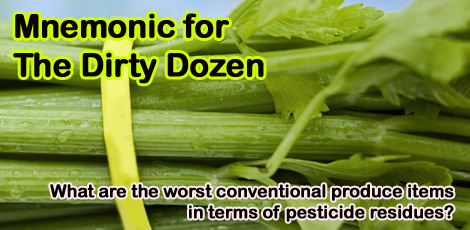
The Environmental Working Group publishes something really useful called the Shoppers Guide to Pesticides. In it, they offer two handy lists: (1) The Dirty Dozen -- conventionally grown produce items that contain the most residual pesticides, and (2) The Clean 15 -- conventionally grown produce items that contain the least residual pesticides.
While we believe that organic is always best, there nonetheless are times when most of us (for whatever reason) consider purchasing or consuming conventionally grown (meaning "sprayed with pesticides") produce.
Read more: Mnemonic for the "Dirty Dozen" Foods that You Should Only Buy if Organic!
Mnemonics for the "Clean 15" -- Or, "Conventional" Produce That Tests Lowest for Residual Pesticides
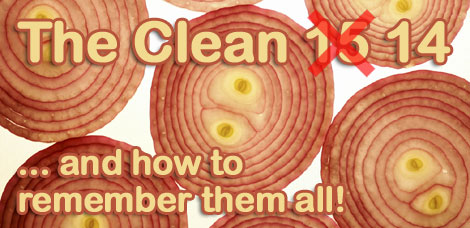
Following up on yesterday's post, today we're going to take a look at the "Clean 15." These are the 15 produce items that, according to research done by the Environmental Working Group, contain the least amount of residual pesticides (even though they're still grown using pesticides).
What this boils down to is: IF you're going to eat conventionally grown produce, these items will harm you much less than those we covered yesterday. So, here's the list, and then we'll try to come up with a sentence to help you (and us) remember everything:
Correction: I said "Lenuria" a number of times in this video, but it's actually Lunaria! In any case, we wanted to share some additional description for this plant. Here's a quick paragraph from Wikipedia:
Lunaria is a genus of flowering plants in the family Brassicaceae, native to central and southern Europe. It includes two species, Perennial honesty and Annual honesty. They are widely grown as ornamental plants in gardens, and have become naturalised in many temperate areas away from their native habitat. In the language of flowers, it means Sincerity and Forgetfulness. ...The common name "Honesty" arose in the 16th century, and it may be due to the translucent seed-pods which are like flattened pea-pods and borne on the plant through winter. In South-East Asia, it is called the "Money Plant," and in the United States as "Silver dollars," because its seed pods have the appearance of silver coins.
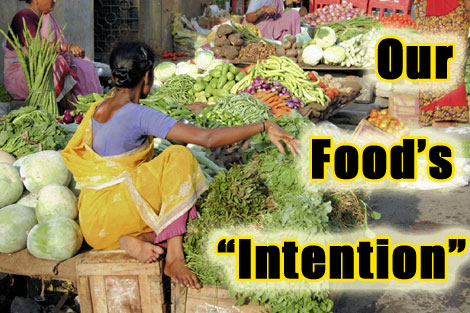
Jim here... During one of our marathon sessions at a Border's book store, I recall reading somewhere about the notion of a fruit's "intention" to be eaten. It's been a few years since I've read that, but I immediately resonated with the notion that many fruits, nuts, vegetables, and seeds are actually evolved to be eaten by other living beings and, therefore, to consume them (or their fruits and seeds) is to participate in a wonderfully nonviolent act that is in perfect harmony with a kind of primordial Earthen symbiosis. Whether these plants, vines, trees, etc. feel a conscious intention to have their fruit eaten by others is a matter of metaphysical conjecture. But, within the context of discussing vegetarianism, the argument is certainly relevant and fairly strong.
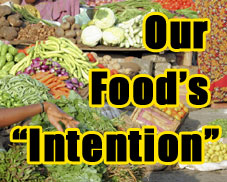 If you walk up to a farm animal, it may be impossible to estimate what's going through its mind, but I feel intuitively that it isn't, "Please kill me and eat my flesh." In other words, there's no "intention" present in that scenario. On the other hand, it's very easy to imagine that a tree produces fruit, knowingly or not, in order to produce offspring. Throughout the entire evolution of that tree, part of that reproductive process has involved animals (including humans) eating the fruit and then "redistributing" (which is a nice way of putting it, I suppose) the seeds naturally.
If you walk up to a farm animal, it may be impossible to estimate what's going through its mind, but I feel intuitively that it isn't, "Please kill me and eat my flesh." In other words, there's no "intention" present in that scenario. On the other hand, it's very easy to imagine that a tree produces fruit, knowingly or not, in order to produce offspring. Throughout the entire evolution of that tree, part of that reproductive process has involved animals (including humans) eating the fruit and then "redistributing" (which is a nice way of putting it, I suppose) the seeds naturally.

Jim here... It's not often that we're able to recommend a movie that's perfectly relevant to the raw food lifestyle. But, if you're a raw vegan and haven't seen The Curious Case of Benjamin Button, we highly recommend this film. Not only is it wonderful, but it's also, for much of the film, a nice metaphor for living the raw foods lifestyle.

In this video, Wendi talks with Leela Mata, spiritual leader of the Peaceful Valley Ashram, about her experiences with the raw food diet and a bit about a cob oven structure that was built on the ashram property. This is part 2 of a 5-part series featuring Peaceful Valley Ashram.
Read more: Leela Mata Discusses Her Experiences with Raw Foods

I realize we keep teasing everyone with vague yet bold talk of some new rawsome health frontier we're pursuing. We'll definitely get to discussing all of that later this year sometime. ?In the mean time, though, we may occasionally run an article or two that reflects a bit of our experimentation.
Lately, Wendi and I have been drawn to a similar style of eating -- although for different reasons. ?You see, we've both been on a real kick to simplify lately. For Wendi, this reflects more of an intuitive response to her diet. For me, it's more of a response to all of the experimentation I spoke of.
